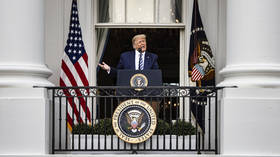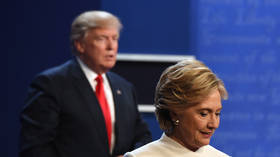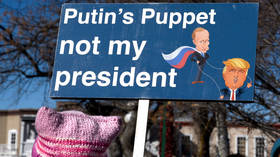‘Russiagate’ is indeed worse than Watergate. Here’s why
Durham document exposes extent of operation involving a tech company, Hillary Clinton’s campaign, and DNC lawyers

The fascinating thing about special counsel John Durham’s investigation is that it keeps revealing things about “Russiagate” almost incidentally, in seemingly unrelated procedural filings concerning prosecutions of process crimes.
For example, a simple conflict-of-interest statement in the case of a high-caliber lawyer charged with lying to the FBI spotlighted a Democrat plot to spy first on candidate then on President Donald Trump, while feeding scurrilous allegations against him to both the FBI and the CIA.
Back in September, Durham charged Michael Sussmann – partner in the DC law firm Perkins Coie, on retainer to the Democratic National Committee – with lying to the FBI. Sussmann allegedly fed the discredited “Alfa Bank” story to the FBI general counsel James A. Baker, claiming he was not acting on anyone’s behalf, while actually coordinating with a tech executive and Hillary Clinton’s presidential campaign.
On Friday, Durham filed an innocuously-titled Motion to Inquire into Potential Conflicts of Interest in the Sussmann case. The 13-page document pointed out that the legal firm representing Sussmann – Latham & Watkins LLP – previously represented his firm of Perkins Coie, its former partner Marc Elias, and the Clinton campaign, all in dealings with the Durham investigation.
So far, so boring – except that the filing also lays out the role of a tech company that exploited access to Trump Tower, another Trump-owned building, a “healthcare provider,” and even “the Executive Office of the President of the United States” (EOP) in order to “mine Internet data to establish ‘an inference’ and ‘narrative’ tying then-candidate Trump to Russia.”
While the Durham documents do not name the company or the executive, they have since been identified by the New York Times as Neustar and Rodney Joffe, respectively. Durham says Neustar was hired by the Obama administration to “access and maintain dedicated servers for the EOP as part of a sensitive arrangement whereby it provided DNS resolution services,” and had access to these servers since at least 2014.
Recall that Sussmann was accused of “coordinating” the tech company’s work with the Clinton campaign, including feeding the Alfa Bank story to the FBI. He allegedly also leaked the story to the press, which then ran multiple articles about the FBI investigation – which were promoted by Clinton herself as well as her aide Jake Sullivan, now President Joe Biden’s national security adviser.
According to Durham, Sussmann also packaged the false Alfa Bank story with another claim that came from Joffe and Neustar – that Trump and his aides used “Russian-made wireless phones” at the White House – and fed it to the CIA, on February 9, 2017, almost three weeks into Trump’s presidency. Durham “identified no support for these allegations” by Joffe.
Now, the FBI is not supposed to spy on Americans without a warrant, while the CIA is not supposed to spy on US soil at all. So how did these two agencies respond to these attempts to weaponize them for political purposes? Well, we know that the FBI was instrumental in the ploy to pressure Trump’s national security adviser Michael Flynn to resign over allegedly lying about his perfectly legitimate conversations with the Russian ambassador to the US.
As for the CIA, its then-director and confirmed Trump-hater John Brennan actually briefed President Barack Obama in July 2016 that Clinton had signed off on a proposal to vilify Trump by “stirring up a scandal claiming interference by the Russian security service.” Three days later, the FBI opened a probe dubbed “Crossfire Hurricane” – targeting not Clinton, but Trump.
Previously, Durham’s probe has revealed the primary sub-source of the infamous “Steele Dossier” – another smear job against Trump, funded by the Clinton campaign, using Perkins Coie, Elias, and the DNC as cutouts – by indicting Igor Danchenko. The former Brookings Institute researcher allegedly fed British spy Christopher Steele the scurrilous allegations about Trump and Russia. The dossier was later used by the FBI to justify the FISA court application to spy on Trump during the campaign and well into his presidency, via campaign aide Carter Page.
FBI lawyer Kevin Clinesmith admitted to falsifying evidence about Page to obtain the FISA warrant, but was given a slap on the wrist and a lesser charge of lying to federal agents instead. He was sentenced to probation by a friendly judge and his law license has since been reinstated, in a remarkable show of partisan standards in Washington.
The narrative that emerges from all these indictments is that Clinton’s 2016 campaign paid a British spy to manufacture a “dossier” of lies against Trump, used a tech company with access to White House servers to manufacture another set of lies, and fed both to the FBI and the CIA – with full knowledge of the Obama administration – all in a bid to prevent Trump from winning the election, and later to sabotage his presidency. That would make “Russiagate” orders of magnitude worse than Watergate, the scandal involving a 1972 burglary of DNC offices that ended up forcing President Richard Nixon to resign a year later.
So obviously, almost every corporate press outlet in the US – 99% of which had endorsed Clinton in 2016, after all – spent the past five years screaming about the (literally nonexistent) Trump-Russia “collusion” and describing it as “worse than Watergate.”
Projection is the oldest play in the propaganda book, after all.
The statements, views and opinions expressed in this column are solely those of the author and do not necessarily represent those of RT.
]https://www.rt.com/news/549580-durham-investigation-russiagate-trump/



0 Comments:
Post a Comment
Subscribe to Post Comments [Atom]
<< Home